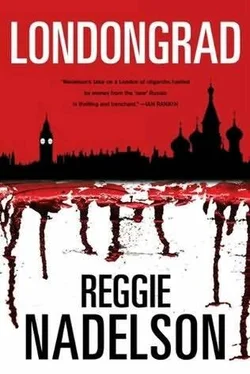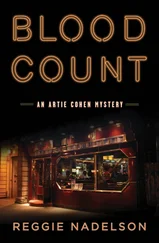I love the water. I used to go out on the party boats from Sheepshead Bay and fish for stripers and blues. A few miles away from where I stood is a secret place I go sometimes, a nice tavern at the edge of the wildlife sanctuary, where you meet other cops and fire guys, Irish mostly; you drink some beers or Guinness and there’s a breeze and it smells unbelievably sweet.
My phone was ringing, but I turned it off and sat with Olga Dimitriovna and ate my fried-egg sandwich and chatted in Russian. She told me there had been three muggings in her building. I told her to keep her door locked at night and the chain on, and I gave her my cell number.
“Anatoly Anatolyevich Sverdloff is a good man,” she said. “He gives to everybody. Please say thank you.” Olga pushed her wire-rim spectacles on top of her head, thanked me again, and offered me a glass of brandy. I refused.
“Please, come back, Artemy,” she said. “And tell Valentina to come.” She kissed my cheek, papery lips against my skin, and handed me a box of chocolates, which she had wrapped carefully with fancy gold paper and a red ribbon. “For Mr Sverdloff who sends me the books. You’ll give this to him?”
“Yes, of course,” I said.
“Tell Valentina I miss her, please.”
“Is there anything else I can do for you?”
She shook her head. “But maybe I will call you for help with some of my neighbors. They are afraid.”
“Of the muggings?”
“Of everything, crime, black people, of the new kind of Russians, of anything different, of a feeling that they may have to move again, or leave America. Most are legal, but they are afraid. They pull down their blinds and pray to God,” she added. “Except God isn’t listening. So some of us fight instead. We fight landlords. We remember how to fight. Goodbye, again, Artemy.”
As I walked along the corridor of Dimitriovna’s floor, I could hear classical music from behind the doors. Doors opened a crack, mostly old people looking out to see who it was, and if it was safe, and seeing other tenants looking out of their apartments, greeted each other in Russian, and fixed social arrangements for cards and tea. One elderly man held the door open long enough to take a good look at me.
“Who are you?” he said in English with a thick accent. “What do you want?” He was angry, I could see he felt I was some kind of interloper, somebody without any real business up here. Maybe he figured me for a developer.
Decades back, these high-rise towers had been built to house immigrants, forty bucks per room back then. They were almost trashed in the 1980s by gangs and guns, and people bolted their doors and rarely went out.
Now the crack dealer creeps had gone the place was threatened instead by Trump, or some other feral developer: take it over, raise the rents, blow it up, co-op it. Looked like by fall the deal would be done.
But Olga Dimitriovna and her friends weren’t going to budge easy, not without a fight, not after they’d made a life, a village up on the sixteenth floor, the old-timers helping the new ones, everybody in and out of each other’s apartments, sitting out on nice days on green and yellow plastic deckchairs, as if the sidewalk in front was a front porch; or making trips over to Brighton Beach to shop or eat on special occasions or maybe to the 92nd Street Y in Manhattan for music once a year.
They would resist. They would organize. If necessary, they would fight. They had survived everything else. Stalin, Hitler. Coming to America.
But even here, thousands of miles from Moscow, people were paranoid. Russia was hot as hell, in several senses, and now Putin was rattling his nukes, and people were secretly thinking: will America bend to these people? Will they cut off the stream of Russian immigrants? Will they listen to Lou Dobbs, the asshole on CNN who rants about immigrants every night? Even Russians with American passports, think: will I have to move again? Where will I go?
Near the elevator, I turned on my cellphone.
“Who is it?” I said, but the signal was dead.
I banged on the elevator door. Where was it?
Some of the tenants reappeared in the hall and watched until the elevator came and I went away. Ingrained in them was a deep suspicion, even hatred, of cops. Somehow they knew I was a cop, or suspected it. I realized I was still carrying the fancy box of chocolates and in the heat, I could smell them. I got into the elevator, feeling somebody was on my back. I opened the chocolates. I ate one. It had a nut in it.
I was still holding the chocolates when I left the building, and as I got to my car, I thought I saw the kid, the Russian girl, Dina.
“Hey!”
I ran after her. Maybe I was wrong. Maybe it was the hot sun in my eyes. I ran until my lungs burned. I caught her near a wire fence that divided the street from a water-plant facility, and a stretch of filthy beach.
When she saw me, she stopped. She hadn’t been running away from me.
“Why were you running?”
“I was looking for somebody,” she said in Russian.
“Who?”
“Nobody.”
We were outside a broken-down housing project. Some of the little yellow tiles had fallen off the façade, like scabs off a half-healed wound.
“You live here?”
She shrugged.
“You want to tell me something?”
“Yes.”
I looked at her. “You’re hungry?”
She nodded and I took her into a bodega on the other side of the street and bought her a ham sandwich and a Coke and a bag of Fritos and watched her eat all of it without stopping. I wondered when she had her last meal. All the time I was with her, she stared at the box of chocolate. I gave it to her. She shoved the candy into her mouth.
“Where do you live? Will you show me?”
“I have something,” said Dina, clutching her fist shut.
“Show me.”
When she opened her hand, she had a thin silver chain with a blue ceramic evil-eye charm in light blue and white.
“Where did you get this?”
“In the playground,” she said.
I waited.
“Will you give me money for it?” She looked up at me and her eyes were like a desperate little animal.
“Why should I?”
“I got it from the playground. I got it near the swing.”
“You took it from her?”
“No. I picked it up.”
“How much?”
“One hundred.”
“No way,” I said in Russian. “No deal.”
“Fifty.” She was tiny and hungry and scared and an easy mark. The necklace wasn’t worth five bucks.
“I’ll give you twenty-five,” I said and she lit up like somebody had turned a switch.
I gave her some bills with one hand while I called a friend, a good female cop I know who would come and help me get the kid to a safe place.
“I want to go home,” she said.
I held on to her as best I could, but as soon as she felt me loosen my grip-I couldn’t handcuff her or anything-she broke away, same as earlier, just broke free and ran like hell and disappeared among the broken buildings.
*
“Artie?” It was Bobo Leven, the detective who had answered the call on the playground case. He was leaning against the jungle gym smoking. I looked at the swings. The body was gone.
“Yeah, hi, Bobo.”
“You got my message?”
“I got it. I’m in a hurry, so what do you need?”
“Thanks for coming.”
“Yeah, sure,” I said. Bobo looked anxious. “You’ll do the case fine, Bobo, you’ll make your name with it.”
His real name was Boris Borisovich Leven, but everyone called him Bobo. He was twenty-eight and smart as hell, having finished Brooklyn College in three years instead of four, followed by his MA at John Jay in criminology. He was still living at home these days, out on Brighton Beach with his parents.
Читать дальше






